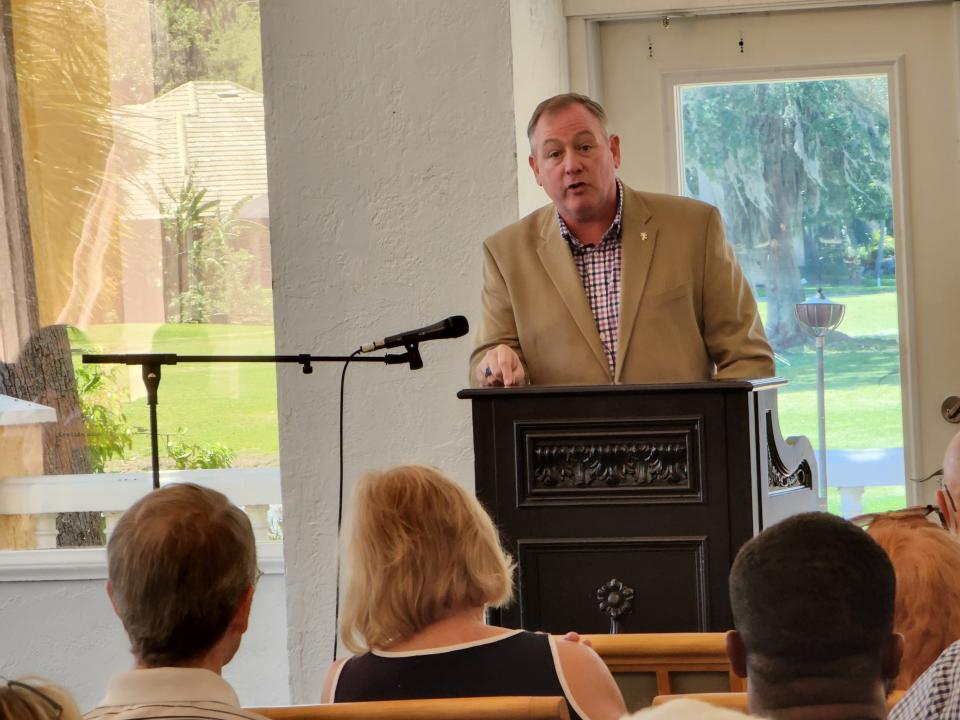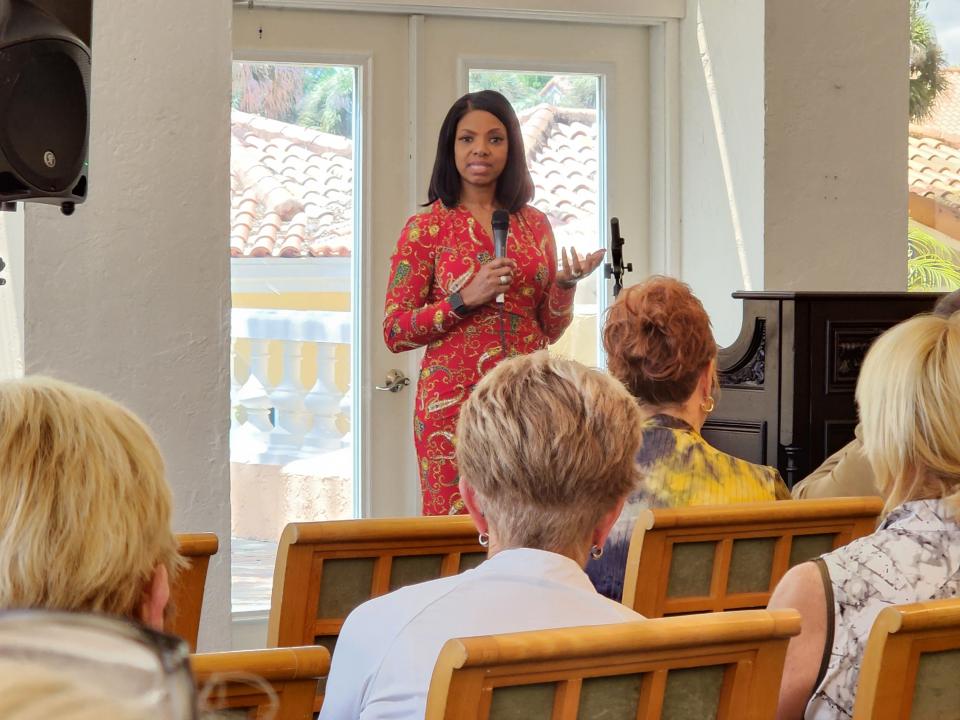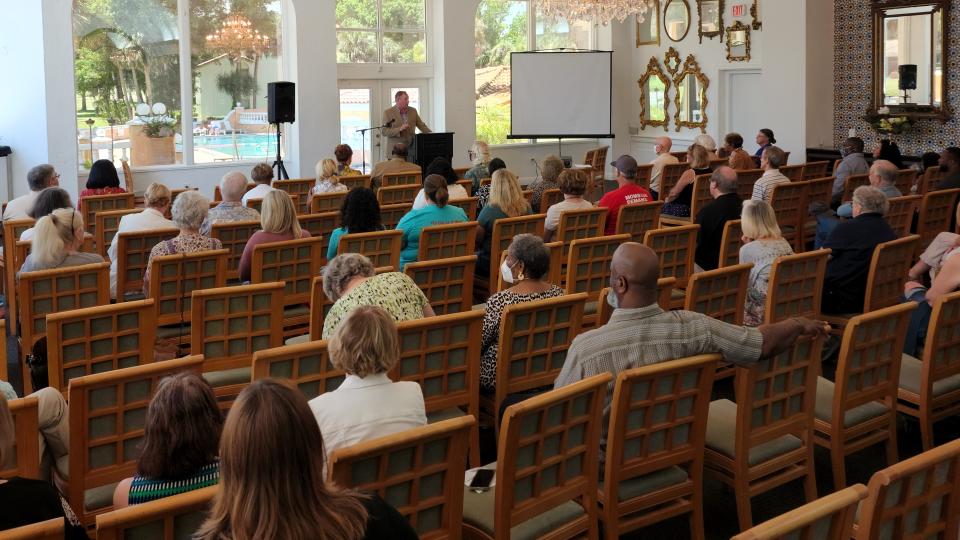'Critical race theory' not what you may think it is, history prof says at Titusville event
Please consider subscribing to FLORIDA TODAY for a limited time offer of $1 for 6 months of unlimited digital access to local coverage on politics, crime, education, and other issues you care about.
Critical race theory is not what you probably think it is.
That was the message of J. Michael Butler, a professor of history at Flagler College in St. Augustine, at a community discussion on the controversial topic held Saturday at the LaCita Country Club in Titusville.
A crowd of about 60, mixed race and mostly older, attended the two-hour event, which was sponsored by the Harry T. and Harriette V. Moore Cultural Complex board of directors and the Humanity Task Force for Social Justice, Inc. Spectrum News 13 anchor Tammie Fields moderated the event.
Butler's presentation — entitled "Critical Race Theory: What it is, What it is not" — was followed by a robust Q&A with audience members.
Brevard School Board: Training accused of critical race theory has nothing to do with race
The version of "critical race theory" assailed by conservative politicians and media critics, often in defense of contentious legislation and executive actions, is an intentional distortion, argued Butler, who has authored two books on the civil rights movement in Florida.
What those critics call critical race theory or "CRT" is a catch-all term, used to demonize what they view as "liberal" ideas about the history of race in the United States, Butler said.

"It is a weaponized word. You can distort it, and present it in a way that's frightening, dangerous, scary," Butler said during his presentation.
The conflation only serves to obscure Black history and foil anything resembling constructive public debate, he said.
Butler pointed to a January incident in which he was disinvited from a seminar on the civil rights movement for Osceola County teachers when school officials worried, without evidence, that his talk would include critical race theory. The incident drew national headlines.
"It's so obviously used for political reasons that its interpretation at the local level leads citizens to argue with each other for reasons that have nothing to do with intellectual honesty. That's an example of this" he said.
In reality, critical race theory is a niche academic school of thought that is mainly taught in law school classrooms, he said, as one way of making sense of the history of law and the courts in light of the nation's ugly (and deeply entrenched) racial past. Critical race theorists typically argue that laws in the U.S. have historically been structured to favor white people over other races, for instance.
But even among those scholars who practice it, there is significant disagreement on what it means and what lessons should be drawn from it, Butler said.
More: School board member recall dominates Brevard County Charter Review Commission talks
"It's a prism through which — one prism, and not the only prism — through which we can understand how the past continues to have impacts on the present," Butler said.
The pre-planned event happened a day after the Florida Department of Education said it had rejected 28 math textbooks submitted for consideration in the state's public school curriculum for "prohibited topics or unsolicited strategies, including CRT," according to a press release.
The announcement, which accused the books of attempting to "indoctrinate" students, mirrored language often used by Gov. Ron DeSantis in his recent efforts to rid Florida schools of what he has derided as "woke politics."
Butler did not face significant pushback from the mostly friendly audience during the question and answer session.

Opponents have argued that CRT is an ideology derived from Marxism that defines people as "oppressors" and "oppressed" based on their race, and which teaches that white people are inherently racist.
While CRT does make uncomfortable claims about racism in the U.S., Butler argued, the extent to which it does so is just the extent to which such claims are supported by historical facts — and history is not supposed to be comfortable, he said.
"If you've been through a history course that's honest, and you don't feel discomfort at times, then either it's not being done right or something's wrong," he said. "It's not to make you feel comfortable about yourself. It's to ask difficult questions about whether or not we are who we think we are."
Organizers William Gary, who heads the Moore Complex board of directors, and Elizabeth Mikitarian, vice president of the Humanity Task Force for Social Justice, said the idea for the event was prompted by the recent political climate and public discussions around CRT, which they said often give people the wrong idea.
Trayvon 10 years later: Can "The Media" do better with race issues?
"My hope is that people will become a little more enlightened and educated on what critical race theory reveals and what it isn't," Gary said.
"That they get a little bit better definition there, so when you hear rhetoric coming from politicians and some other folks, you can very clearly discern, is this factual? Or this is a misinformation campaign?"
Eric Rogers is a watchdog reporter for FLORIDA TODAY. Contact Rogers at 321-242-3717 or esrogers@floridatoday.com. Follow him on Twitter @EricRogersFT.
Please consider subscribing to FLORIDA TODAY for a limited time offer of $1 for 6 months of unlimited digital access to local coverage on politics, crime, education, and other issues you care about.

This article originally appeared on Florida Today: Critical race theory expert draws crowd at Titusville event

